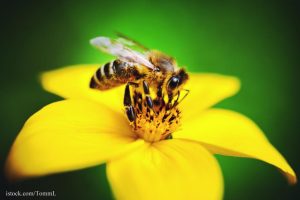Honey bees around the world have been dying off at an alarming rate in recent years. Because the insect is so important to America’s food supply, the USDA is giving five midwestern states $4 million to help farmers and ranchers improve honey bee health.
 Agriculture Secretary Tom Vilsack said, “the future of America’s food supply depends on honey bees, and this effort is one way USDA is helping improve the health of honey bee populations. Significant progress has been made in understanding the factors that are associated with Colony Collapse Disorder and the overall health of honey bees, and this funding will allow us to work with farmers and ranchers to apply that knowledge over a broader area.”
Agriculture Secretary Tom Vilsack said, “the future of America’s food supply depends on honey bees, and this effort is one way USDA is helping improve the health of honey bee populations. Significant progress has been made in understanding the factors that are associated with Colony Collapse Disorder and the overall health of honey bees, and this funding will allow us to work with farmers and ranchers to apply that knowledge over a broader area.”
The Midwest is home to more than 65% of the commercially managed honey bee hives in the country from June to September. This time period is when bees forage to build up hive strength for the winter. In 2006, beekeepers began seeing a 30 to 90% die-off in the bee population over the winter.
Bee pollination is responsible for $15 billion worth of crops every year; that includes more than 130 fruits and vegetables. The money will give support to farmers to implement conservation practices to provide “safe and diverse food sources” for honey bees. Inhibiting invasive species, providing quality forage and habitat, reducing erosion, and increasing soil health are all part of the project.
Farmers and ranchers in Michigan, Minnesota, North Dakota, South Dakota, and Wisconsin will receive the funs. Applications are due on Friday, November 21, 2014.




